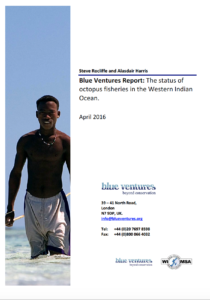
The status of octopus fisheries in the Western Indian Ocean
Summary Octopus fisheries are an important resource for coastal communities throughout much the WIO region. In many coastal zones with coral reefs, octopus fishing dominates small-scale

Summary Octopus fisheries are an important resource for coastal communities throughout much the WIO region. In many coastal zones with coral reefs, octopus fishing dominates small-scale
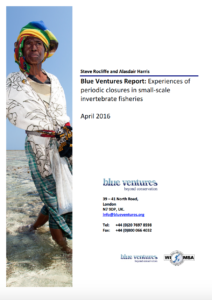
Summary Periodic closures, which are also known as temporary, short-term, rotational, periodically harvested, or non-permanent closures, temporarily ban the harvesting of marine resources in specific areas
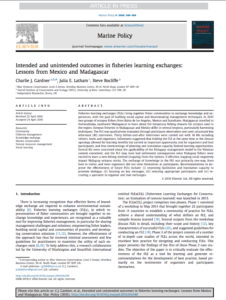
Abstract Fisheries learning exchanges (FLEs) bring together fisher communities to exchange knowledge and experiences, with the goal of building social capital and disseminating management techniques.
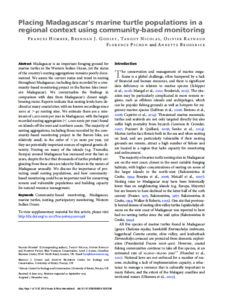
Abstract Madagascar is an important foraging ground for marine turtles in the Western Indian Ocean, yet the status of the country’s nesting aggregations remains poorly
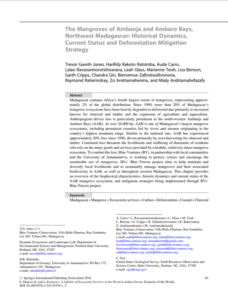
Abstract Madagascar contains Africa’s fourth largest extent of mangroves, representing approximately 2% of the global distribution. Since 1990, more than 20% of Madagascar’s mangrove ecosystems
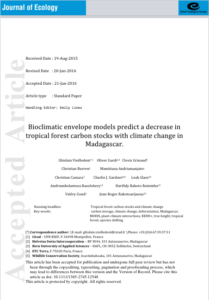
Summary 1.Recent studies have underlined the importance of climatic variables in determining tree height and biomass in tropical forests. Nonetheless, the effects of climate on
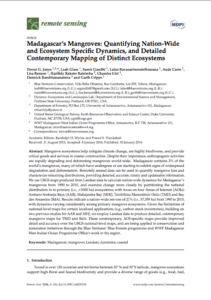
Abstract Mangrove ecosystems help mitigate climate change, are highly biodiverse, and provide critical goods and services to coastal communities. Despite their importance, anthropogenic activities are
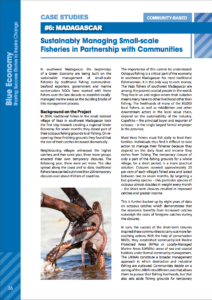
In southwest Madagascar, the beginnings of a Blue Economy are being built on the sustainable management of small-scale fisheries by traditional fishing communities. Blue Economy
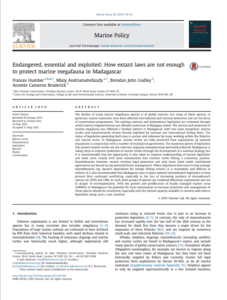
Abstract The decline of many marine megafauna species is of global concern; but many of these species, in particular marine mammals, have been afforded international
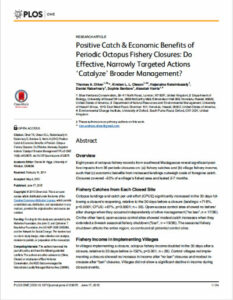
Eight years of octopus fishery records from southwest Madagascar reveal significant positive impacts from 36 periodic closures on: (a) fishery catches and (b) village fishery
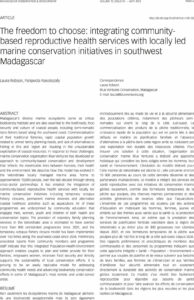
Abstract Madagascar’s diverse marine ecosystems serve as critical biodiversity habitats and are also essential to the livelihoods, food security and culture of coastal people, including
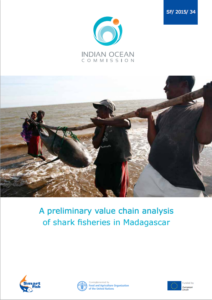
Executive Summary Madagascar’s extensive (~6,500 km) coastline comprises the most diverse and extensive shallow marine habitats in the Western Indian Ocean, supporting an estimated 123
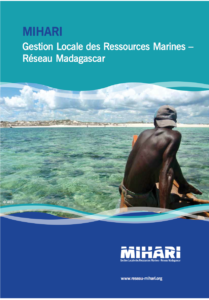
Le système d’apprentissage entre pairs constitue un outil très efficace pour renforcer les capacités locales en terme de gestion des ressources halieutiques. Cette approche permet
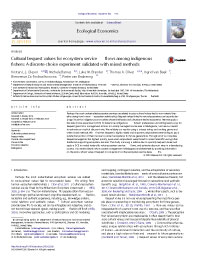
Abstract Perhaps the most understudied ecosystem services are related to socio-cultural values tied to non-material benefits arising from human–ecosystem relationships. Bequest values linked to natural
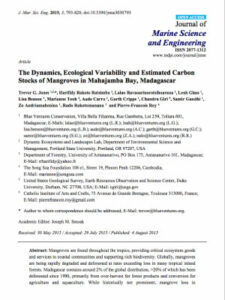
Abstract Mangroves are found throughout the tropics, providing critical ecosystem goods and services to coastal communities and supporting rich biodiversity. Globally, mangroves are being rapidly
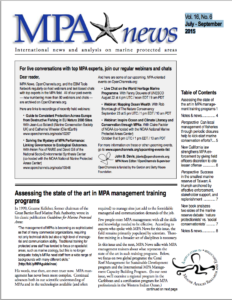
For many years, the Vezo – traditional fishers in southwest Madagascar – saw marine conservation as a threat, a way of preventing them from accessing
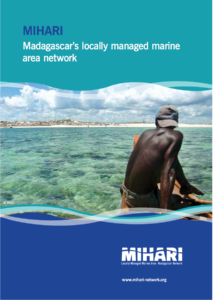
Peer-to-peer learning is a highly effective tool for building local capacity and confidence for fisheries management and catalysing the adoption of community-led conservation efforts. With
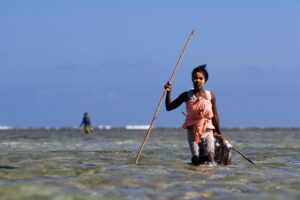
Our strategy is to develop, scale and drive the adoption of high-impact models for marine conservation. We have a proven track record of innovating transformative
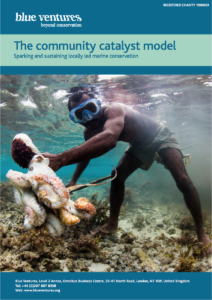
Most marine conservation efforts fail. Declaring areas of ocean permanently off-limits to fishing all too often puts conservation at loggerheads with the needs of coastal
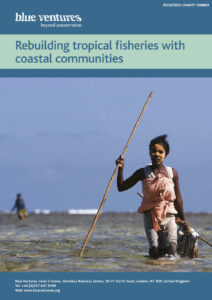
Marine conservation efforts often fail when short-term costs are perceived to outweigh future benefits, which may be uncertain. All too often, forgoing fishing in protected
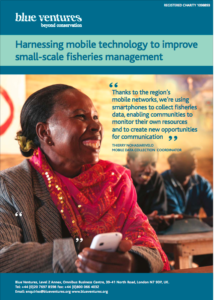
Blue Ventures has pioneered the use of mobile technology to address the challenge of data-deficiency in small-scale fisheries, capitalising on the rapid expansion of mobile
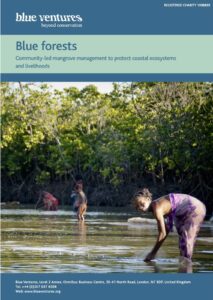
We are contributing to the science required to make community-led, rights-based blue carbon projects a reality, and building the capacity of local management associations to
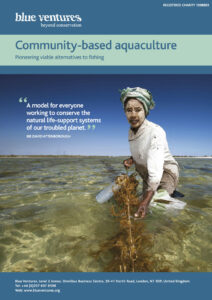
Traditional small-scale fisheries are fundamental to the livelihoods and food security of hundreds of millions of people throughout the world. Yet marine ecosystems and the
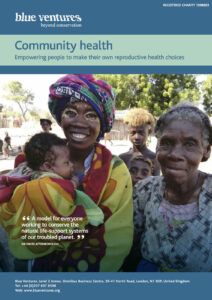
We work with some of the world’s most isolated coastal communities, whose access to health services is severely limited. In direct response to the unmet family
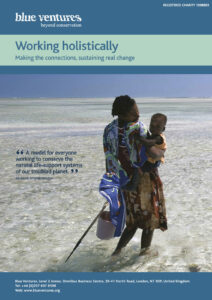
Blue Ventures recognises the inextricable links between poor health, unmet family planning needs, food insecurity, environmental degradation and vulnerability to climate change. In response to
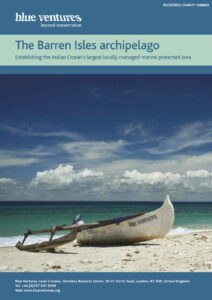
The Barren Isles archipelago is one of the few remaining strongholds of thriving marine biodiversity in the western Indian Ocean. Lying off the west coast
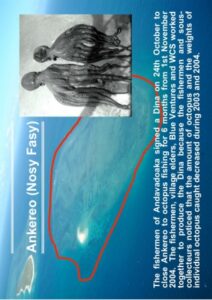
The fishermen of Andavadoaka signed a Dina on 24th October to close Ankereo to octopus fishing for 6 months from 1st November 2004. The fishermen,
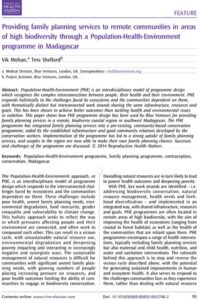
Abstract Population-Health-Environment (PHE) is an interdisciplinary model of programme design which recognises the complex interconnections between people, their health and their environment. PHE responds holistically
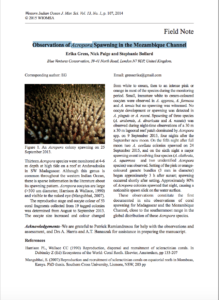
Thirteen Acropora species were monitored at 4-6 m depth at high tide on a reef at Andavadoaka in SW Madagascar. Although this genus is common
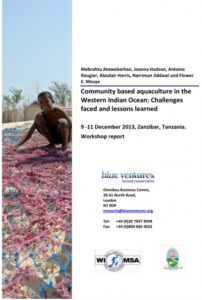
Executive Summary (extract) Community based aquaculture (CBA) is seen as an important Alternative Income Generating Activity (AIGA) for marine resource dependent coastal communities, and has